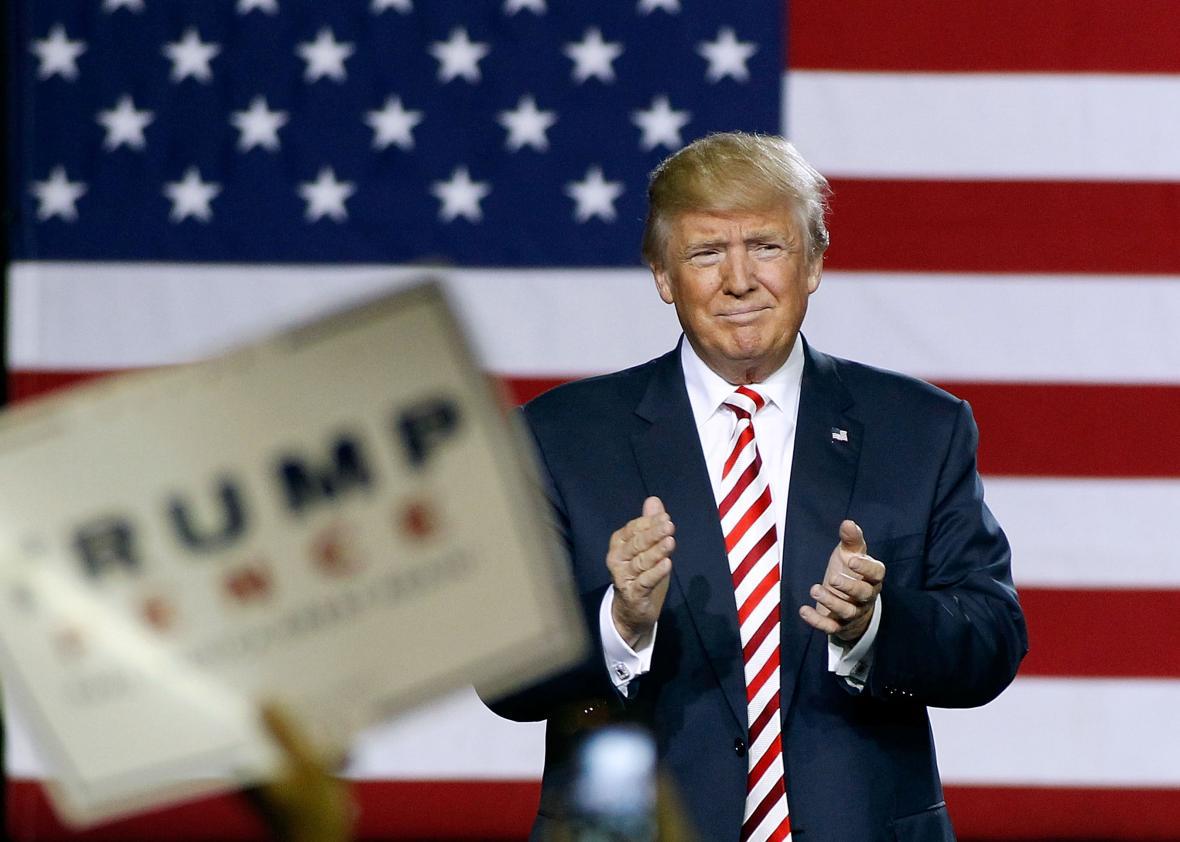During Tuesday’s vice presidential debate, Republican Mike Pence recited a litany of woes overhanging the U.S. economy. “We’ve seen an economy stifled by more taxes, more regulation, a war on coal, and a failing health care reform come to be known as Obamacare,” he said in his opening statement. He repeated versions of this catechism several times, uttering the phrase “war on coal” four more times.
The war on coal, the Trump campaign believes, is a vital part of the economic case against the Obama years. The argument: that Democrats on the national level hate coal because they’re obsessed with curbing emissions and protecting the environment. That their actions against a domestic energy source have hurt the economy not just by throwing miners out of work, but because they’ve made power more expensive for everybody. That if we put Republicans in charge of policy, coal will roar back. And that making this case will help GOP tickets in states where coal is a major industry, such as Pennsylvania and Illinois.
Pretty much every part of this thinking—economically, industrially, politically—is wrong. The Trump campaign misunderstands the dynamics at work behind coal’s dramatic loss of market share, what is happening in the country’s wholesale power markets, and the power of politicians to change any of that.
There’s no doubt that there is a war on coal and that the industry is suffering. Coal production fell 23 percent between 2008 and 2015, and so far this year it’s off another 22 percent. In Kentucky, mining employment is at its lowest level since 1898.
But this war has many combatants. One of them is certainly the federal government. The Obama administration has been pushing for cleaner power and lower emissions from the electricity sector, which is bad for coal. In its two terms, the Obama administration has also extended existing subsidies for the renewable power industries—especially wind and solar—and added new ones.
Among the most important factors behind the surge of renewables have been state-level renewable portfolio standards, the regulations and legislation through which many of the 50 states mandate that a certain amount or percentage of power delivered come from sources other than fossil fuels. And deep red states have been among the most ambitious and effective in enacting RPS. Texas, which set one up in 1999, has become the nation’s leader in wind production. Iowa, which is under firm Republican control, already gets more than 30 percent of its electricity from wind. This summer, an Iowa utility announced plans for a giant wind farm that, upon completion, will allow it to meet 85 percent of its customers’ needs with wind power—displacing a huge amount of coal-fired electricity.
Although renewables have grown rapidly, they still represent a small fraction of overall power production. In fact, natural gas has inflicted far more damage on coal than wind, solar, or the U.S. government. The application of fracking, which has raged unabated during the Obama years, has liberated vast cheap supplies of domestic natural gas. The utility industry, motivated by a desire to earn profits and keep costs low, has been shifting wholesale from coal to natural gas.
Because electricity use isn’t growing that much in this country, coal and natural gas are engaged in a zero-sum game. In 2008, coal accounted for 48 percent of electricity generation, compared with just 21 percent for natural gas. By 2015, coal’s market slipped to 33 percent, while natural gas saw its share rise to 32.6 percent—a virtual tie. So far this year, natural gas is beating coal by 34 to 29 percent. Oh, and the displacement of coal hasn’t led to electricity becoming more expensive. Rather, it has coincided with electricity becoming less expensive.
Republicans seem to believe that being anti-coal—or being perceived as anti-coal—will hurt Democrats. That theory would hold water if Democrats lose or struggle in elections in coal states that they might otherwise be expected to win. But as this map of coal mines shows, there isn’t much coal-mining activity in swing states. The three biggest coal-producing states are Wyoming (a state Democrats haven’t won since 1964), followed by West Virginia and Kentucky, which are 94 percent and 88 percent white, respectively, and in which national Democrats haven’t competed in presidential years since 1996. The fourth and fifth biggest coal producers are Pennsylvania and Illinois, both of which Democrats have won handily for six straight elections and which Hillary Clinton is running away with. The only swing state in which coal could plausibly be an issue is Ohio, which is the 10th largest coal producer.
Finally, the idea that partisan chief executives at the national or state level could make a difference is absurd. So long as coal’s main competition is natural gas, governors, senators, and even presidents will be pretty much powerless to reverse coal’s decline. Gov. Chris Christie of New Jersey has been one of Trump’s most loyal supporters. He doesn’t hesitate to throw his weight around to influence organizations in his state and has been hostile to climate change issues in recent years. And yet, the very morning after Tuesday’s Pence-Kaine debate, PSEG, New Jersey’s dominant utility, announced it would close two giant coal plants in the state—the last two coal plants it operates there—by next spring. “The sustained low prices of natural gas have put economic pressure on these plants for some time. In that context, we could not justify the significant investment required to upgrade these plants to meet the new reliability standards,” said Bill Levis, president and chief operating officer of PSEG Power. Translation: Nobody will buy the power those plants produce because other plants using a different fuel can make electricity cheaper.
For the foreseeable future, no one can reverse the economics of power production to favor coal. Not even Donald Trump.
